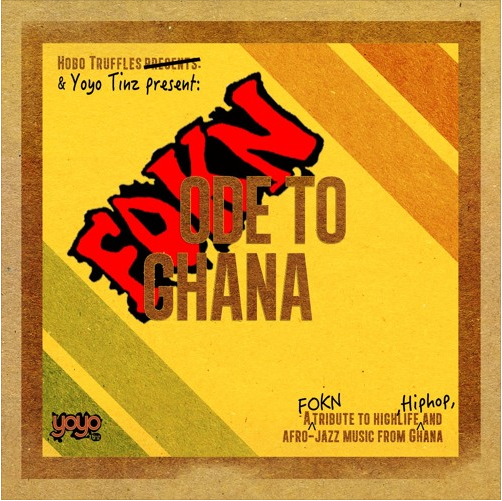As hip-hop has become a lingua franca across the world, it's been fascinating to watch every culture where the music alights interpret hip-hop in its own way. FOKN Bois, the clown princes of Ghanaian hip-hop, just self-released their own FOKN Ode to Ghana that comfortably stands alongside hip-hop or r&b from anywhere, while the title, sample sources and subject matter prove the album could come from nowhere else.
Two years ago, a collective of producers called Hobo Truffle digitally released an album of hip-hop instrumentals comprised of samples from Ghana's musical past. Across the 21-track Ode to Ghana, back beats, bass and synthesizer update and add emphasis to clips of highlife and Afrojazz.
With African music—especially older African music—attracting a lot of interest from musicians of all types, including rappers as famous as J. Cole, that someone would find “Ode to Ghana” and rap over the tracks seems inevitable. The way Mensa Ansah and Wanlov the Kubolor, together known as the FOKN Bois, tell it, they came across the release and couldn't resist.
And really, who would've wanted them to? With FOKN Ode to Ghana, the Bois have found a fitting and catchy place to hang their verses and sampled conversations. In alternating lines, they can be cutting, funny, and even—if just for moments at a time—sincere. The extent to which the listener knows Ghana may be the limit to how much he or she understands the jokes, but for 21 tracks the record remains a breezy, always enjoyable listen.
While their closest musical analogue may be the short-lived American trio Das Racist, Afropop's Banning Eyre describes FOKN Bois as “the "South Park" of Ghanaian music.” Their satirical lyrics are known to go unflinchingly for the outrageous, including a song called “Sexin' Islamic Girls,” which they said they intended as a homage to women who have taken liberation on themselves; or a song about local pastors being furious when Jesus' return interrupts the purchase of a new yacht.
But FOKN Bois bites most famously in the song “Thank God We Are Not Nigerians.” Although the rappers told Eyre that the song was intended as a tongue-in-cheek way to poke fun at Ghanaians for lacking the cultural pride that Nigerians exhibit, the comments below a performance of the song on YouTube are a stern reminder that not everyone shares the same sense of humor or familiarity with irony. People seem pretty angry, actually.
Perhaps as a sort of apology, FOKN Ode to Ghana includes a sequel to “Thank God...” called “Ghanaway,” which begins with a sample of a Ghanaian woman explaining how she's racist against Nigerians, listing a bunch of negative stereotypes of them, before admitting “Yeah, I need to work on it.” A FOKN Boi quips, “Yeah, you do.” Then, lest you think they've lost their taste for being shocking, the beat starts up with “This is the Ghana way of thinking about African-Americans,” followed by the refrain: “Thank God we are not an African-Americans,” and then the verses, a bunch of negative, if familiar, stereotypes and caricatures. It may be an indictment of Ghanaian beliefs, but it's safe to say YouTube will miss the subtlety.
Make no mistake though, love for an African-American art form is all over the record. In addition to lyrics, the FOKN Bois added spoken word interludes, samples, and as many skits as an old De La Soul album. The song “Tribe Chief” briefly dances down the melody from Outkast's “So Fresh, So Clean.”
Just as Wiyaala achieved with pop music on her self-titled album, the “FOKN Ode to Ghana” is distinctly Ghanaian, but with sonic pleasures that are by no means exclusive. The source material for the backing tracks were artists who took jazz, Cuban clave and Western instrumentation and melded it all with traditional musical forms to create something new: highlife and Afrojazz. With sampling and rap, FOKN Bois gleefully takes up the baton and runs with it into the 21st century.










